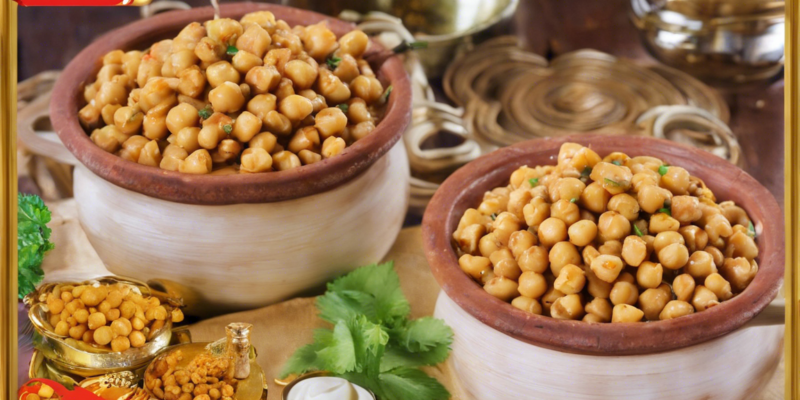Chickpeas, also known as garbanzo beans, are a versatile and nutritious legume that has been a staple of diets around the world for centuries. Not only are chickpeas delicious, but they also offer a wide range of health benefits. In this comprehensive guide, we will explore the many reasons why eating chickpeas should be a regular part of your diet.
Nutritional Profile of Chickpeas
Chickpeas are packed with nutrients that are essential for overall health and well-being. Here are some key nutritional highlights of chickpeas:
1. Protein
Chickpeas are an excellent source of plant-based protein, making them a great option for vegans and vegetarians. One cup of cooked chickpeas provides around 15 grams of protein.
2. Fiber
Fiber is important for digestive health, and chickpeas are rich in both soluble and insoluble fiber. A high fiber intake has been linked to a reduced risk of chronic diseases such as heart disease and diabetes.
3. Complex Carbohydrates
The carbohydrates in chickpeas are complex, providing a slow and steady release of energy. This makes chickpeas a good option for maintaining stable blood sugar levels.
4. Vitamins and Minerals
Chickpeas are a good source of several vitamins and minerals, including iron, folate, phosphorus, and manganese. These nutrients play important roles in various bodily functions, such as energy production and red blood cell formation.
Health Benefits of Chickpeas
In addition to being nutrient-dense, chickpeas offer a variety of health benefits. Here are some key reasons to include chickpeas in your diet:
1. Heart Health
The fiber, potassium, and antioxidants in chickpeas have been linked to a reduced risk of heart disease. Chickpeas can help lower LDL (bad) cholesterol levels and support overall heart health.
2. Weight Management
Due to their high fiber and protein content, chickpeas can help promote feelings of fullness and reduce overall calorie intake. Including chickpeas in meals may aid in weight management and contribute to healthy eating habits.
3. Blood Sugar Control
The combination of fiber and protein in chickpeas can help stabilize blood sugar levels and prevent spikes after meals. This can be beneficial for individuals with diabetes or those at risk for developing the disease.
4. Digestive Health
The fiber in chickpeas supports a healthy digestive system by promoting regular bowel movements and feeding beneficial gut bacteria. A healthy gut microbiome is essential for overall well-being and immune function.
5. Bone Health
Chickpeas contain important minerals like phosphorus, manganese, and calcium, which are essential for maintaining strong and healthy bones. Including chickpeas in a balanced diet can help support bone health and reduce the risk of osteoporosis.
Ways to Incorporate Chickpeas into Your Diet
There are countless ways to enjoy the nutritious goodness of chickpeas in your daily meals. Here are some ideas to help you incorporate chickpeas into your diet:
1. Salads
Add chickpeas to your salads for an extra boost of protein and fiber. Roasted chickpeas can also serve as a crunchy topping for added texture.
2. Hummus
Hummus, a popular Middle Eastern dip made from chickpeas, tahini, and lemon juice, is a delicious and nutrient-rich snack. Enjoy it with veggies, pita bread, or as a spread on sandwiches.
3. Curries and Stews
Chickpeas are a great addition to curries and stews, adding texture and substance to the dish. They pair well with a variety of spices and flavors.
4. Roasted Snack
Roast chickpeas with your favorite seasonings for a crunchy and satisfying snack. Roasted chickpeas are a healthy alternative to processed snacks and are perfect for on-the-go munching.
5. Baking
Explore gluten-free baking options by using chickpea flour in recipes like pancakes, muffins, and cookies. Chickpea flour adds a nutty flavor and boosts the nutritional value of baked goods.
Frequently Asked Questions (FAQs) about Chickpeas
1. Are chickpeas good for weight loss?
Yes, chickpeas are a great food to include in a weight loss diet due to their high fiber and protein content, which can help promote feelings of fullness and reduce calorie intake.
2. Can chickpeas help lower cholesterol levels?
The combination of fiber and antioxidants in chickpeas has been linked to lowering LDL (bad) cholesterol levels, which can benefit heart health and reduce the risk of cardiovascular disease.
3. Are canned chickpeas as nutritious as dried chickpeas?
While canned chickpeas are convenient, dried chickpeas retain more nutrients as they are less processed. However, rinsing canned chickpeas can help reduce sodium content.
4. Can chickpeas cause bloating?
Chickpeas contain oligosaccharides, a type of carbohydrate that can be difficult to digest for some people, leading to bloating or gas. Soaking and cooking chickpeas thoroughly can help reduce this effect.
5. How much chickpeas should I eat per day?
The dietary guidelines recommend consuming around 1.5 to 2 cups of legumes per week, including chickpeas. It is best to incorporate chickpeas as part of a balanced diet along with a variety of other plant-based foods.
In conclusion, chickpeas are a nutrient-dense food that offers a wide range of health benefits, from supporting heart health to aiding in weight management and blood sugar control. By incorporating chickpeas into your diet in creative and delicious ways, you can enjoy the goodness of this versatile legume while promoting your overall well-being.

Comments